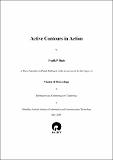Please use this identifier to cite or link to this item:
http://drsr.daiict.ac.in//handle/123456789/95| Title: | Active contours in action |
| Authors: | Banerjee, Asim Shah, Pratik P. |
| Keywords: | Active contours Image processing Image reconstruction Image segmentation Imaging systems Optical data processing Optical pattern recognition |
| Issue Date: | 2005 |
| Publisher: | Dhirubhai Ambani Institute of Information and Communication Technology |
| Citation: | Shah, Pratik P. (2005). Active contours in action. Dhirubhai Ambani Institute of Information and Communication Technology, viii, 48 p. (Acc.No: T00058) |
| Abstract: | There was considerable success in converting images into something like line drawings without resorting to any but the most general prior knowledge about smoothness and continuity. That led to the problem of “grouping” together the lines belonging to each object which is difficult in principle and very demanding of computing. Two terms that describes this problem in image processing tasks are edge detection and segmentation. Active contour models are proven to be very effective tools for image segmentation. The popularity of this semiautomatic approach may be attributed to its ability to aid segmentation process with apriori knowledge and user interaction. For more detailed application domain study for active contours, problem of converting a frontal photograph into a line drawing is taken up along with lip tracking based on Gradient Vector Flow force field (GVF) active contours. In images with gaussian and salt-pepper noise, segmentation process becomes difficult for gradient based methods. This work gives a solution to this problem. A novel break n’ join technique is presented and simulated for various images ranging from synthetic to real with convex and concave regions. And as an outcome, encouraging results are observed. |
| URI: | http://drsr.daiict.ac.in/handle/123456789/95 |
| Appears in Collections: | M Tech Dissertations |
Files in This Item:
| File | Description | Size | Format | |
|---|---|---|---|---|
| 200311039.pdf Restricted Access | 3.79 MB | Adobe PDF |  View/Open Request a copy |
Items in DSpace are protected by copyright, with all rights reserved, unless otherwise indicated.
